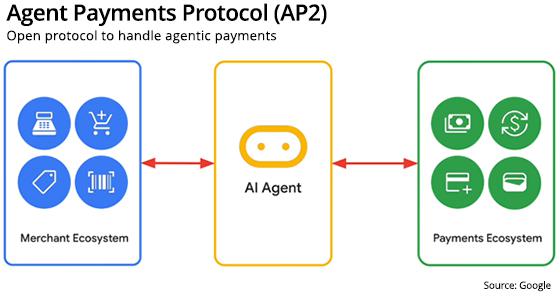
This holiday shopping season could look a lot
different. On Tuesday Google announced a new way for AI agents to transact payments on behalf of users and across platforms, in collaboration with more than 60 industry partners committing to
advancing agentic commerce in time for the holidays.
The impact of agentic commerce on shopping is not yet fully understood, but the internet continues to undergo fundamental shifts as
consumers use chatbots to ask questions rather than click on a blue link or website.
Today’s payment systems are built for humans. Agent Payments Protocol (AP2), developed by
Google engineers, will provide the foundation to enable AI agents to transact payments on behalf of users and merchants. The protocol creates a common language for agents to transact across
platforms.
Companies participating in the rollout include fintech companies such as Revolut, Coinbase, and Paypal; merchants and SaaS companies including Etsy, Salesforce, and Intuit;
and financial institutions including American Express and Mastercard.
advertisement
advertisement
Google had to ensure security played a major role in developing the protocol. There had to be a way to ensure that a
person gave agent specific authority to make a purchase. How a merchant could verify an accurate request from an agent. Whether there is fraud involved -- and if so, who remains accountable.
AP2, which unlocks new commerce experiences, will offer two primary ways that a user will shop with an agent.
Real-time purchases with a human present to approve will rely on “intent
mandates” like “Find me new white running shoes.” This provides the auditable context for the entire interaction in a transaction process.
After the agent presents a cart
with the shoes, the consumer signs a Cart Mandate. This is a critical step that creates a secure, unchangeable record of the exact items and price, ensuring what the consumers sees it will pay
for.
In the future, when humans are not present, the platform will delegate the task. Queries might include “Buy concert tickets the moment they go on sale.” In this scenario, the
consumer signs a detailed Intent Mandate upfront.
This mandate specifies the rules of engagement — price limits, timing, and other conditions. It serves as verifiable,
pre-authorized proof that can allow the agent to automatically generate a Cart Mandate on the consumer’s behalf once precise conditions are met.
In both instances, a chain of
evidence is created to identify the reason to link a payment method to the verified contents of the Cart Mandate.
Google explains that this complete sequence — from intent to cart to
payment — creates a trustworthy audit trail.
The growing ecosystem of Google partners building agent-to-agent (A2A) agents is supporting AP2.
In the future the ecosystem will
extend into enterprise companies for B2B applications, such as enabling autonomous procurement of partner-built solutions via Google Cloud Marketplace or the automatic scaling of software licenses
based upon real-time needs.
Google posted technical specification on the GitHub repository to review. The
complete technical specification, documentation, and reference implementations are available.